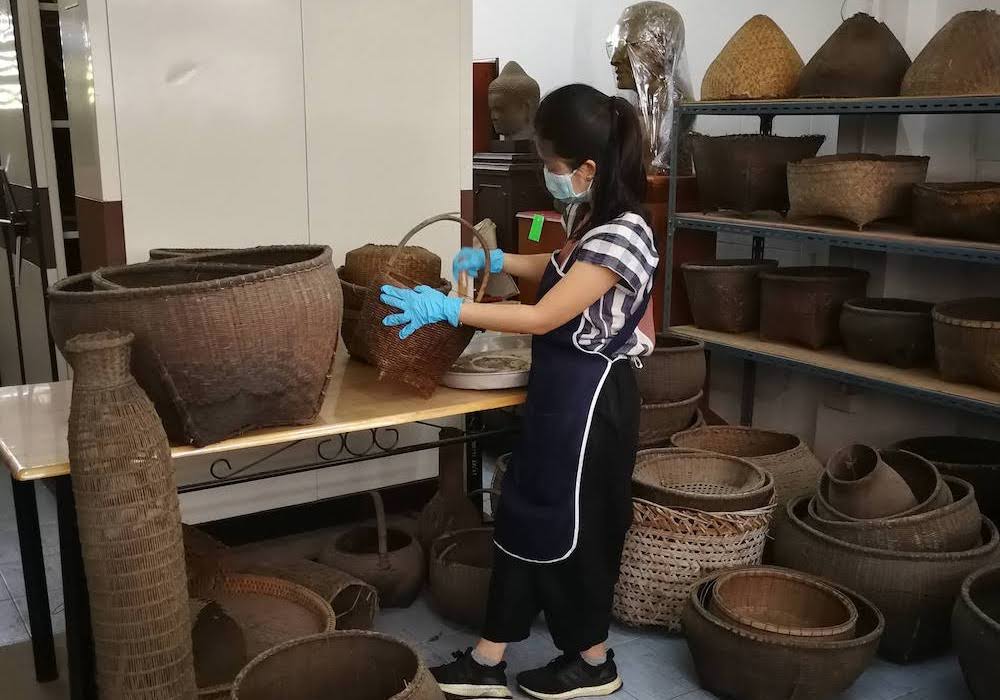 Organizers
Organizers
- The National Museum of Tajikistan
- National Research Institute of Cultural Heritage, Republic of Korea (NRICH)
- ICCROM
Partners
- Cultural Heritage Administration of the Republic of Korea (CHA)
Why
 Conserving heritage collections is vital to ensure that they are in good condition, accessible, and therefore ready to serve present and future communities of users to their fullest potential. This is no easy task, given the wide variety of materials and manufacturing techniques of heritage artefacts, and the multiple environmental hazards (chemical, biological, physical) they are exposed to. Understanding the underlying principles of key deterioration phenomena threatening heritage collections is thus essential to inform effective conservation decisions. By recognizing these cause-effect relationships, collections caretakers can devise meaningful preventive and reactive measures to manage risks while optimizing the use of typically limited resources. This includes research into locally available materials and solutions, fostering innovation and sustainability.
Conserving heritage collections is vital to ensure that they are in good condition, accessible, and therefore ready to serve present and future communities of users to their fullest potential. This is no easy task, given the wide variety of materials and manufacturing techniques of heritage artefacts, and the multiple environmental hazards (chemical, biological, physical) they are exposed to. Understanding the underlying principles of key deterioration phenomena threatening heritage collections is thus essential to inform effective conservation decisions. By recognizing these cause-effect relationships, collections caretakers can devise meaningful preventive and reactive measures to manage risks while optimizing the use of typically limited resources. This includes research into locally available materials and solutions, fostering innovation and sustainability.
What
The course will boost the scientific literacy and capacity of participants and their organizations, enabling them to understand and sustainably manage relevant deterioration phenomena affecting their heritage collections.
At the end of the course, participants will be able to:
- Identify the main hazards or agents that cause deterioration of heritage collections.
- Identify the main sources and pathways leading to the exposure of heritage collections to these hazards/agents.
- Understand the main deterioration phenomena (chemical, biological, physical) affecting heritage collections when they are exposed to these hazards/agents.
- Assess, prioritize, and effectively communicate risks related to the exposure of heritage collections to these hazards/agents.
- Devise (cost-)effective strategies to prevent and mitigate the deterioration of heritage collections due to exposure to these hazards/agents.
- Formulate meaningful research approaches to investigate the use of locally available materials and solutions to improve collections care.
Where
The course will take place at the National Museum of Tajikistan in Dushanbe, Tajikistan.
How
The course will be delivered through highly interactive lectures, engaging practical sessions including group work, hands-on exercises, and study visits. An interdisciplinary, multicultural course team will provide an enabling environment, ensuring effective communication and participation. The interface between science and collections care will be explored throughout the course, taking advantage of existing resources and relevant initiatives in the local context. Participants’ contributions will include presentations of case studies from their own institutions, sharing of relevant experiences from their countries, and submission of a project proposal to improve collections care and sustainability in their organizations through the application of scientific principles.
Who
The course will have up to 20 participants, of which 16 from the Asia-Pacific region, and 4 from other regions. Participants must have at least three (3) years of experience working with heritage collections, including collection managers, curators, conservators, and scientists.
Course fee
Selected candidates will not be required to pay any course fee.
Scholarship
A number of scholarships will be available for selected candidates, kindly provided by CHA-Korea for professionals from the Asia-Pacific region, and by ICCROM for professionals from other regions. Priority will be given to selected candidates from ICCROM Member States. Scholarships will cover round-trip travel, accommodation, and meals in Dushanbe during the course.
To apply
Please use the course application form.
Please note that your personal statement in the application form is a fundamental requirement. You are expected to send approximately 500 words on: “How scientific principles can support collections care.”
To finalize your application, the following digital files will be required when completing the online form:
- Portrait photo (allowed formats: gif jpg jpeg png tif tiff with a maximum file size of 3 MB)
- Official endorsement (allowed formats: pdf doc docx jpg jpeg png tif tiff with a maximum file size of 5 MB)
For further information, please contact collasia2023@iccrom.org
